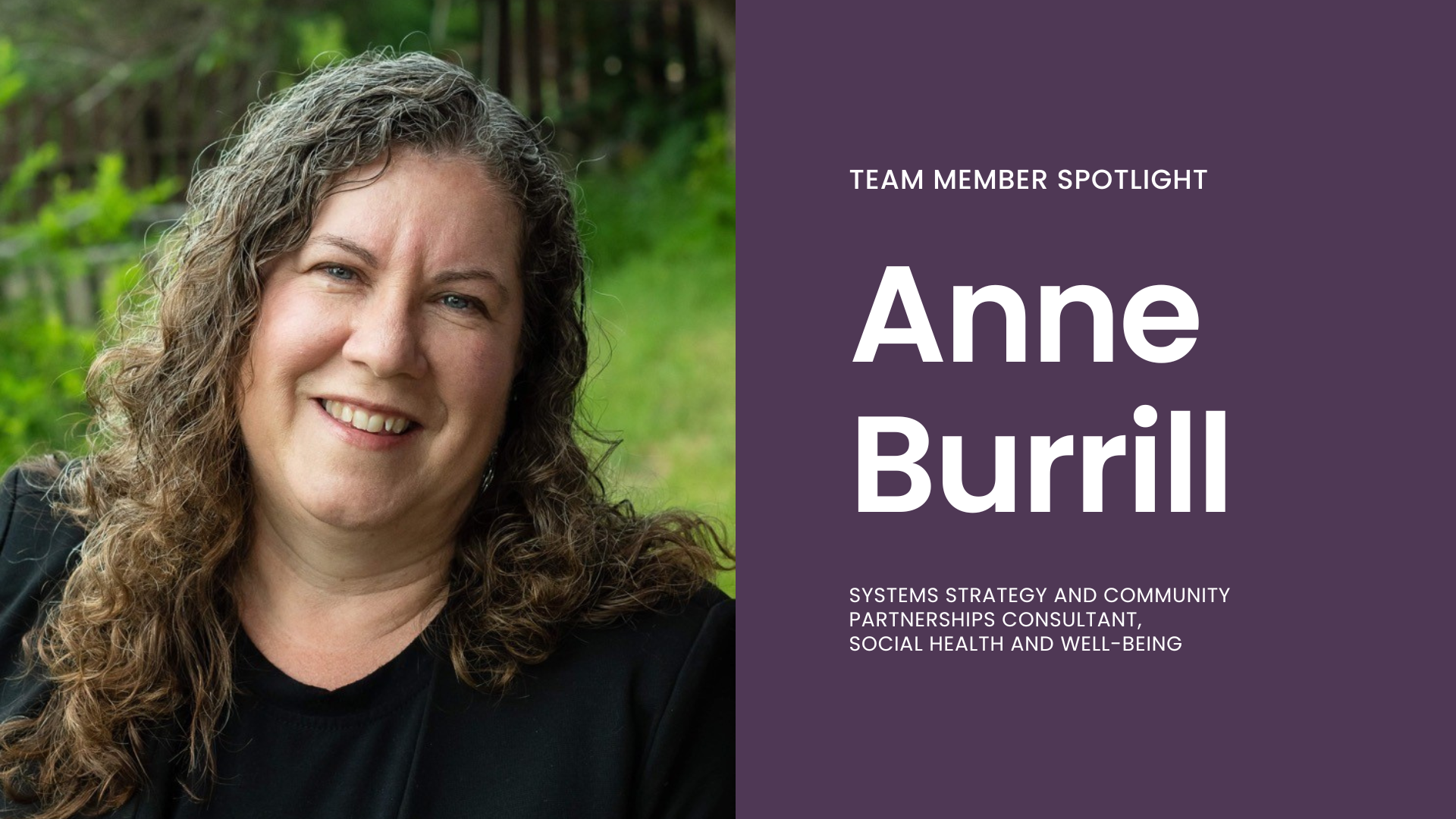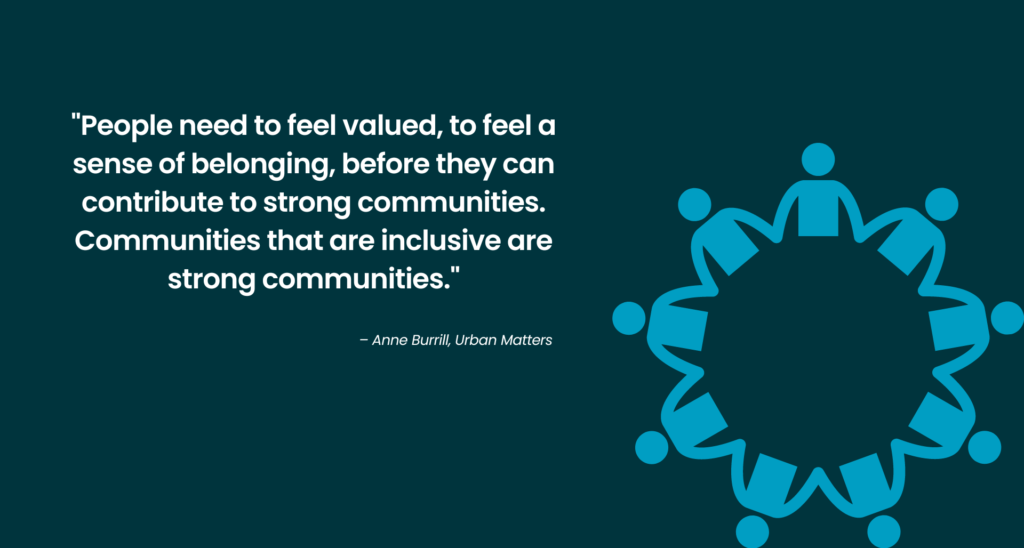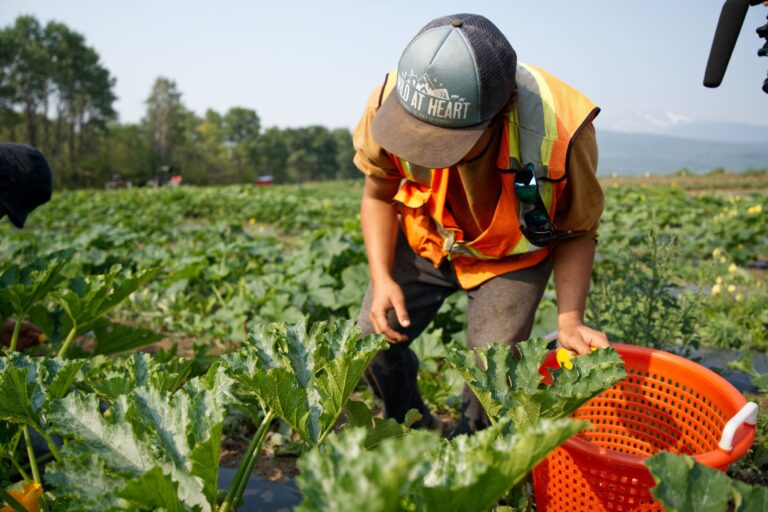
29 November 2022
Anne Burrill: Dedicated to strong communities
We’re excited to welcome Anne Burrill to the Urban Matters team!
Anne is joining us as a Social Health and Well-being Consultant, where she will be working with our team of changemakers focused on influencing and disrupting complex social systems to co-create better outcomes in communities. Before coming to Urban Matters, Anne spent the first half of her career working primarily in the non-profit sector, followed by 10 years working with local governments and Indigenous organizations. She also worked as an independent consultant for six years prior to coming to our team.
Anne has a master’s degree in social work from the University of Northern British Columbia (UNBC) with a focus on social policy and community development. She completed her master’s part time while also working full time as an executive director managing a non-profit organization. She also became a parent in the midst of those intense five years.
Anne grew up in the Cariboo and lived in Williams Lake for 25 years. After joining our team, she moved to Kamloops, B.C. with her family and is focusing on making connections in her new community. We spoke with Anne about her approach to Social Health and Well-being, what drew her to the field, and what makes her so passionate about systems-level change.
For someone to take on a master’s degree, full-time work, and a baby all at once, you must be very passionate about this field. What inspired you the most to take this path?
In many ways, I think my passion for this work is rooted in how I grew up. I was raised west of Williams Lake on a little homestead with my family in a tiny community that didn’t have a lot of services or resources—everyone was pretty independent, but also had to depend on each other. What I took from that was both an understanding of hard work and independence—having to work really hard to get the things that you need and want—but also a really strong sense of the importance of community and being able to count on each other. If there was ever any kind of crisis, it sounds kind of cliché but it’s so true, people had to rely on and have relationships with fellow community members to survive.
It instilled a set of values in me around community, connection, supporting each other, and actively creating the kind of community you want to live in. It illuminated the fact that creating this kind of community was the responsibility of the people that lived there, not some outside organization. When something happened there, people stepped up. Those values, coupled with the fact that people that live in those communities are pretty independent—they have that pioneer spirit—it’s an interesting juxtaposition of values but I really think my passion for this work came from that early experience of knowing that communities need to have connection.
When I was in university trying to decide what to do with my life, what really appealed to me about social work and the kind of work I do now was a focus on community development and systems-level change. I spent some time doing the frontline jobs that seem more typical of a social work role, but I found myself getting quite frustrated. It felt like I could help one person temporarily but there was always going to be another person in line behind them, and another behind them, and networks of people and families that were struggling. I realized that in order to make things better, which probably is my driving force, I had to be involved in creating programs, changing systems, and developing responses that were more effective than what we were already doing.
If we can get people to understand that they are connected to other people, that we have a shared responsibility for each other, that our collective well-being depends on everyone doing well, that’s the beginning to community growth and change and to better outcomes overall.

From your perspective, and the lens you have on both consulting and social health and well-being, what drew you to Urban Matters?
From a professional perspective, I had worked for six years completely independently with a similar approach to Urban Matters in terms of building relationships with organizations and communities and leveraging those relationships to build community capacity through project work.
I didn’t go into consulting in a very intentional way. I was working in municipal government for eight years and suddenly my position was cut completely out of the blue. I had work that I was really invested in, that I had plans for, that I believed would make a difference, and I just decided that if the municipality wasn’t going to continue to support that work, I needed to find a new home for it because it was work I knew was important to the community. There was lots of support in the community for it, so I went out and used those networks and the relationships I had to find a new home for those projects.
I ended up essentially building my consulting practice just by developing the projects I knew were important to the community; one project led to the next and that went on for six years. I had started to realize pre-pandemic—but it was certainly affirmed during the pandemic—that working on my own was isolating and extremely difficult. This was largely due to the fact that you’re the only person executing the project from concept, to the proposal, to technical work, to all the data analysis and interpretation to formatting and so forth. You don’t have a team of people to help support you. This, in combination with wanting to work in other geographies and at larger scales, and not having a lot of colleagues that were engaged in systems level work, made me realize that I wasn’t going to be as productive without finding more thinking partners and others that I could work through challenges with.
That’s where Urban Matters was really attractive to me. It provided that team; I could work with other people that understood systems change and community building. It was also clear that it was an organization deeply committed to systems change, and to building capacity for communities to be stronger, more resilient, and better places for everyone. When I looked at the values of both Urban Matters and Urban Systems along with how they work and their structures, it just really felt like the perfect fit.
On a professional level, it felt like coming home. It was so clearly the next step for me.
On a personal level, I lived in Williams Lake for a really long time. There were so many opportunities for me career-wise that it seemed like the right fit. But I was starting to feel stuck. I really wanted to grow my practice in ways that could have more influence. Practically I wanted to do different kinds of projects and expand into different areas of work as well as work with different communities, which is really hard to develop as an independent consultant. Coming to Urban Matters was an opportunity for me to grow professionally, grow my practice, and have the support of a team who was doing the same kind of work in the same kind of way as I was.
Your position as a Social Health and Well-being Consultant encompasses many things. If there was one thing you want people to know about you or your role, what would it be?
Strong communities are the core of a healthy society. We know that the most vulnerable people—the people that are struggling the most—are not only affecting their own lives and families, but the whole community. Compassionate responses to individuals are of course important, but if we can bring the heath and well-being of the most vulnerable people in our community up, it also creates a stronger and healthier community for everybody. All our futures are tied together.
That’s what I’m most passionate about: building the capacity of communities to be strong communities, to be connected, to care about everybody in their community, to go beyond just believing that their own individual heath and success is enough to get them through. As we face the challenges we’re going through as a society, from homelessness to the drug crisis to climate change and all of the ripple effects that go along with that, if we don’t have strong communities that’s going to be our downfall. And we have to have systems across society that support that.
That’s what I love about Urban’s approach. We’re not just there to do the projects; we’re there to build strong communities. The approach is to find a way to support communities to build their own capacity and not be reliant on us forever, and to use what we learn to strengthen our understanding of and influence over systems in order to make them better at supporting people and strengthening communities.
Is there anything else you would like to highlight?
Something that I haven’t really talked about explicitly is the importance of inclusion and belonging. I mean the inclusion of people in communities who have all kinds of diversity and differences, all kinds of strengths. I think that’s a dimension of building community capacity: building a sense of belonging and inclusion in communities for everybody regardless of their background or their strengths or the challenges they face. People need to feel valued, to feel a sense of belonging, before they can contribute to strong communities. Communities that are inclusive are strong communities.




